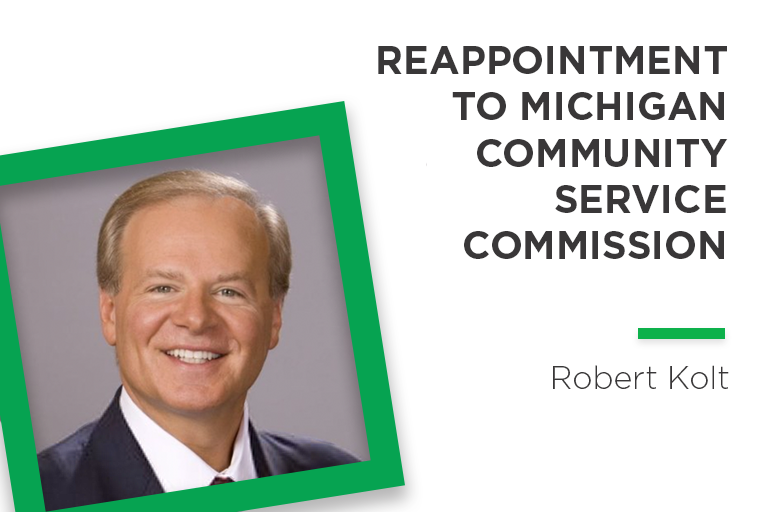Robert Kolt, professor of practice in the Department of Advertising and Public Relations and the president and CEO of Kolt Communications, Inc., was first appointed to the Michigan Community Service Commission in 2012 by Gov. Rick Snyder, and has served as its chair since 2017. Now in his tenth year serving on the commission, Gov. Gretchen Whitmer announced earlier this spring that Kolt will continue representing experts in promoting service and volunteerism. The Michigan Community Service Commission is the state’s lead agency supporting volunteerism.
The spirit of community service
Kolt notes that while there is a desire among individuals in the state to volunteer their time, it might not be clear how the public can get involved. By leveraging partnerships with federal agencies, such as AmeriCorps, the commission can obtain both the funding and the logistical support needed to launch initiatives. AmeriCorps in Michigan involves nearly 1,000 members and $25 million in annual federal funding support.
“Really, the whole objective is to support volunteerism and service as a strategy for solving community problems,” said Kolt. The commission has supported a wide range of projects across the state, including health initiatives in Grand Rapids, community safety in Detroit, water distribution programs in Flint, literacy programs, wetland cleanups, disaster relief in affected regions and so much more.
“It's just a wide variety of things that we consider,” Kolt said.
Kolt's personal experience serving on boards with groups like The Capital Region Community Foundation, The Capital Area United Way, Michigan Nurses Association Foundation and the Lansing Rotary Club Foundation, all have provided him with decades' worth of skills and connections useful to the role – not to mention a wealth stories to tell, as his students can attest.
“I usually talk a lot about service, and the great thing is that I've successfully gotten several students to apply for internships working for the commission and generating the stories of people who volunteer,” said Kolt.
Students in his classes can expect anything from putting together a public relations portfolio, to simulated press conferences and on-camera interviews. He wants students to get a sense of how it feels to be in those moments, analyze situations together and come up with better strategies.
“Public relations is fun. It's the best job in the world,” said Kolt. “What I have to do is share the importance of working with other people, communicating how important public relations can be to support organizations and corporations.”
Not a partisan issue
Kolt feels honored to have been appointed to the Michigan Community Service Commission by both Republican and Democratic governors. “It's kind of a rare occurrence, and it's a wonderful thing that I'm proud of,” Kolt said.
“Being chair means making sure that things get approved and moved through the process for funding, that’s really what I do. And it's a pretty high bar to make sure that every program gets a unanimous vote from the Commission, but we've done it that way since I've become chair. It's been wonderful to watch programs grow in Michigan,” said Kolt.
Professor Kolt explains that the commission itself, by design, must be comprised of an equal mix of Republicans, Democrats and Independents. Where this sort of membership may lend itself to disagreements of philosophy in other facets of government, Kolt strives for consensus and unanimous votes on each and every program that comes to the commission for funding.
“I'm grateful to do it. We've seen a tremendous increase in funding from the federal government and in private grants,” Kolt said. “The commissioners are great, and they work really hard. I'm excited to continue serving as a Commissioner and Chair for another three-year term. The Commission is very diverse. I've appreciated serving with a lot of other great commissioners who are all very cooperative – and that's part of my role, is to make sure that that everybody works together – that volunteerism and service is not a partisan issue.”
By Jessica Mussell
